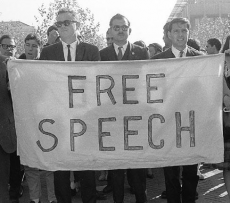
In 1948, in the immediate aftermath of a War that left much of Europe in ruins and deprived millions of their basic rights, article 19 of the United Declaration of Human Rights (UDHR) declared:
Everyone has the right to freedom of opinion and expression; this right includes freedom to hold opinions without interference and to seek, receive and impart information and ideas through any media regardless of frontiers.
In the following years, this statement was reinforced by several international and regional conventions, including the European Convention on Human Rights (ECHR) in 1950 and the International Covenant on Civil and Political Rights (ICCPR) in 1966. Today many countries have not only accepted these conventions, but have also incorporated protection of the Freedom of Expression (FoE) into their own constitutions, such that approximately 87 percent of national constitutions now offer some protection of this basic freedom, at the very least in theory. However, recent terrorist attacks, such as the shootings on the highly provocative French magazine Charlie Hebdo are indications of a seemingly growing dissatisfaction with limitless Freedom of Expression in western liberal democracies. The debates about possible limits to FoE have existed as long as the term itself but the recent intensity of the attacks demands that we pay renewed attention to the debate. Many would argue that there can be no legal limits to the Freedom of Expression
One of the most important reasons there should not be limits to the freedom of expression is that many political scientists argue that the ability to form an opinion and to change it – to grow and develop intellectually – is an inherent part of being human. Limiting the principle would limit the growth and development of citizens, which would be bad not only for individuals but also for the societies they are in, which would be affected by citizens who are not free.
The most important critique that is raised whenever someone tries to put limits on the freedom of expression is that it would be impossible to determine who would decide which thoughts are acceptable and which are not. There would be no guarantee that the limits on FoE would not move onto to a slippery slope much like what happened in Stalinist USSR or Maoist China, which resulted in the deaths of thousands of people with the wrong perceived opinions.
A restriction which could perhaps be applied to the freedom of expression is a principle called the ‘harm principle’, which argues that anyone can say anything they want to as long as it does not directly kill or seriously harm anyone else. This means that if someone committed murder, for example, and claimed that this act should be allowed because it was “intended by its agent to communicate to one or more persons some proposition or attitude…” the law against murder would not be void in the face of FoE and a conviction would be appropriate.
Instead of trying to limit what people are allowed to say, many argue that there should be more education to allow people to understand each other better so that they do not feel the wish to harm each other with words or otherwise.
Image 1: http://www.google.co.uk/imgres?imgurl=http://cs.stanford.edu/people/eroberts/cs201/projects/communism-computing-china/freespeech.jpg&imgrefurl=http://cs.stanford.edu/people/eroberts/cs201/projects/communism-computing-china/censorship.html&h=432&w=490&tbnid=uQqP_3JPo3PmyM:&zoom=1&tbnh=160&tbnw=181&usg=__ItokgDKEL-4f07kuQbLPagCLjLw=&docid=vdYwBr2LMpUDzM&itg=1

0 Comment:
Be the first one to comment on this article.